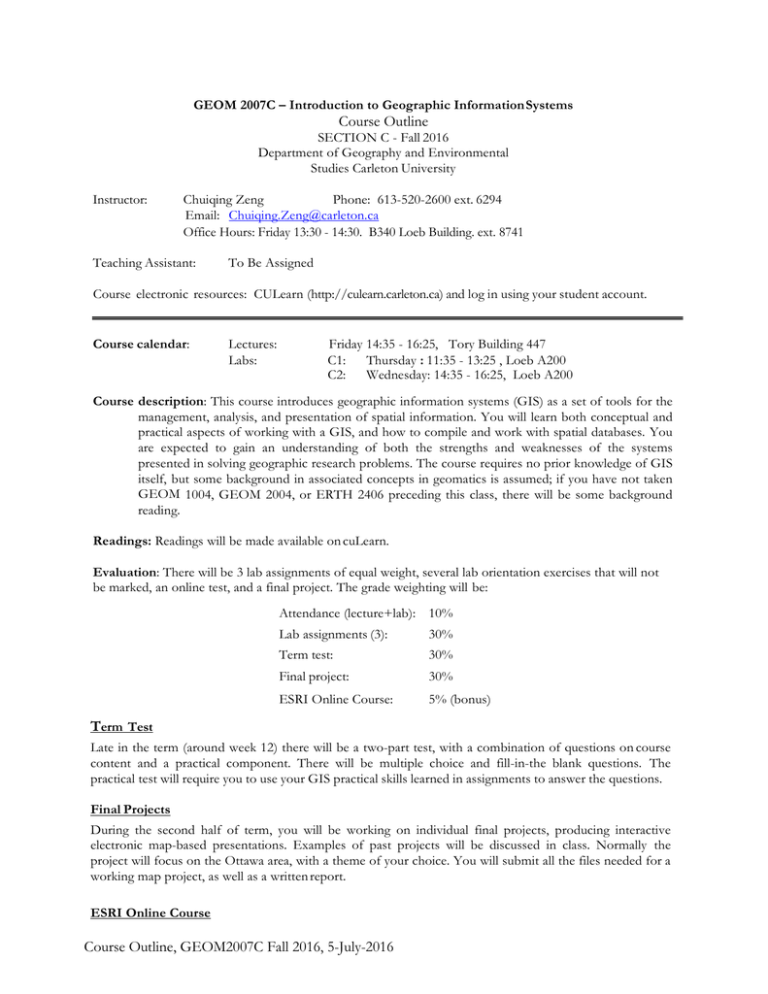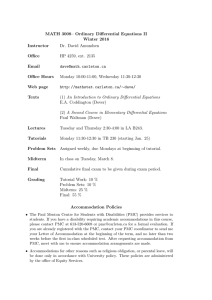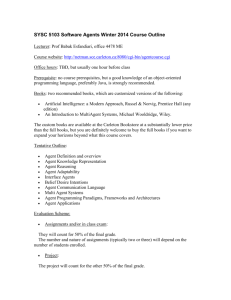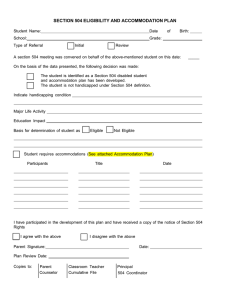Course Outline, GEOM2007C Fall 2016, 5-July
advertisement

GEOM 2007C – Introduction to Geographic Information Systems Course Outline SECTION C - Fall 2016 Department of Geography and Environmental Studies Carleton University Instructor: Chuiqing Zeng Phone: 613-520-2600 ext. 6294 Email: Chuiqing.Zeng@carleton.ca Office Hours: Friday 13:30 - 14:30. B340 Loeb Building. ext. 8741 Teaching Assistant: To Be Assigned Course electronic resources: CULearn (http://culearn.carleton.ca) and log in using your student account. Course calendar: Lectures: Labs: Friday 14:35 - 16:25, Tory Building 447 C1: Thursday : 11:35 - 13:25 , Loeb A200 C2: Wednesday: 14:35 - 16:25, Loeb A200 Course description: This course introduces geographic information systems (GIS) as a set of tools for the management, analysis, and presentation of spatial information. You will learn both conceptual and practical aspects of working with a GIS, and how to compile and work with spatial databases. You are expected to gain an understanding of both the strengths and weaknesses of the systems presented in solving geographic research problems. The course requires no prior knowledge of GIS itself, but some background in associated concepts in geomatics is assumed; if you have not taken GEOM 1004, GEOM 2004, or ERTH 2406 preceding this class, there will be some background reading. Readings: Readings will be made available on cuLearn. Evaluation: There will be 3 lab assignments of equal weight, several lab orientation exercises that will not be marked, an online test, and a final project. The grade weighting will be: Attendance (lecture+lab): 10% Lab assignments (3): 30% Term test: 30% Final project: 30% ESRI Online Course: 5% (bonus) Term Test Late in the term (around week 12) there will be a two-part test, with a combination of questions on course content and a practical component. There will be multiple choice and fill-in-the blank questions. The practical test will require you to use your GIS practical skills learned in assignments to answer the questions. Final Projects During the second half of term, you will be working on individual final projects, producing interactive electronic map-based presentations. Examples of past projects will be discussed in class. Normally the project will focus on the Ottawa area, with a theme of your choice. You will submit all the files needed for a working map project, as well as a written report. ESRI Online Course Course Outline, GEOM2007C Fall 2016, 5-July-2016 Finish this assigned ESRI online virtual course and obtain a certificate, then you will receive a 5% bonus for the course. However, the maximum of your course overall grade is 100%. Other Issues Technical problems occasionally cause delays. Every effort will be made to prevent this from the lab systems perspective. It is your responsibility to reduce your exposure to potential problems by reading and listening to all instructions thoroughly and carefully, and taking care to avoid risky practices. You must practice careful file management (saving files in the proper directories, deleting all unwanted files, naming files thoughtfully, and keeping track of where everything is) at all times. This course depends on a progression of practical exercises, with skills building upon each other across assignments. Late labs will not be accepted, except in extreme cases with legitimate, documented reasons. If you are not finished by the due date, it is best to turn in what you have at that time to get partial credit – it is very important that you do not get behind as new work is assigned. Standing in a course is determined by the course instructor subject to the approval of the Faculty Dean. This means that grades submitted by the instructor may be subject to revision. No grades are final until they have been approved by the Dean. Plagiarism is a serious offence and will not be tolerated. If you submit someone else's work (ideas or material) as your own, that is plagiarism. All ideas presented which are not your own must be properly referenced. This includes more than just verbatim presentation of the writings or ideas of others as one's own – it can also include near-verbatim copying, or even the use of someone else’s ideas, from other students, books, the Internet, or anywhere else. All plagiarism offences will be reported to the Faculty Dean’s office. You will often be working collaboratively to prepare for an assignment and possibly even to collect data, but you must ALWAYS submit individual course work. This means that every assignment must be written and submitted individually, demonstrating your personal understanding and interpretation of the assignment content. Carleton’s Academic Integrity Policy covers all these expectations and more, and is available at http://www2.carleton.ca/studentaffairs/academic-integrity Academic Accommodation You may need special arrangements to meet your academic obligations during the term. For an accommodation request the processes are as follows: Pregnancy obligation: write to me with any requests for academic accommodation during the first two weeks of class, or as soon as possible after the need for accommodation is known to exist. For more details see the Student Guide. Religious obligation: write to me with any requests for academic accommodation during the first two weeks of class, or as soon as possible after the need for accommodation is known to exist. For more details see the Student Guide Academic Accommodations for Students with Disabilities: The Paul Menton Centre for Students with Disabilities (PMC) provides services to students with Learning Disabilities (LD), psychiatric/mental health disabilities, Attention Deficit Hyperactivity Disorder (ADHD), Autism Spectrum Disorders (ASD), chronic medical conditions, and impairments in mobility, hearing, and vision. If you have a disability requiring academic accommodations in this course, please contact PMC at 613-520-6608 or pmc@carleton.ca for a formal evaluation. If you are already registered with the PMC, contact your PMC coordinator to send me your Letter of Accommodation at the beginning of the term, and no later than two weeks before the first in- Course Outline, GEOM2007C Fall 2016, 5-July-2016 class scheduled test or exam requiring accommodation (if applicable). After requesting accommodation from PMC, meet with me to ensure accommodation arrangements are made. GEOM2007C – Fall 2016 – Tentative Term Schedule The following indicates my plan for the term. Individual topics may shift as required (especially after Reading Week), but tests and due dates are fixed. Course Schedule Week Date of Lecture Lecture Topic(s) Practical Work (labs) Sept 9 Introduction to Course and GIS No lab / ESRI online course (optional) 2 Sept 16 Lab familiarity 3 Sept 23 Spatial data: coordinates and projections (review), data models Attribute data: databases, attribute queries 4 Sept 30 Spatial queries, manipulating vector data Assignment 1 continues 5 Oct 7 Effective cartography Assignment 1 due Assignment 2 starts 6 Oct 14 Vector data input: creating layers and digitizing; MADGIC presentation Assignment 2 continues Project proposals assigned 7 Oct 21 Spatial analysis 1 Assignment 2 due Assignment 3 starts 9 Nov 4 Spatial analysis 2 Assignment 3 continues 10 Nov 11 Assignment 3 due Work on projects 11 Nov 18 Customizing ArcGIS – Building models and tools Network analysis; 3D visualization; 12 Nov 25 Theoretical test in lecture Test (practical) 13 Dec 2 Other GIS software/Guest Lecture Work on projects 14 Dec 9 Wrap-up / review project requirements Final Project Due by end of the day on Dec 9. 1 RW Assignment 1 starts Study Break / Reading Week (no classes) Course Outline, GEOM2007C Fall 2016, 5-July-2016 Project proposals due Work on projects


